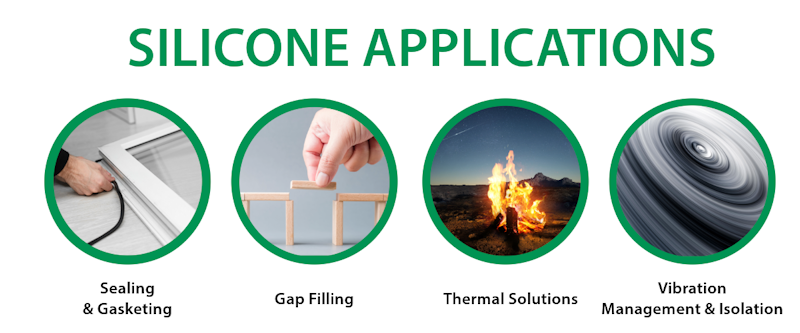
Published
by Rogers Corporation
Elastomeric Material Solutions
People are often surprised to learn about the many different applications and industries that rely on the superior performance of silicone materials. From the aerospace and defense sector to healthcare and renewable energy, silicones have quietly become a mission-critical material across a wide range of fields.
In Which Applications are Silicones Used?
Design engineers rely on silicones to solve their toughest problems, making them a versatile choice across various industries. Here are some key applications of silicones:
- Sealing & Gasketing: Silicones are renowned for their excellent sealing properties. They are used in the automotive, aerospace, and construction industries to create airtight and watertight seals. Silicone gaskets and seals are resistant to extreme temperatures, chemicals, and UV radiation, delivering long-lasting performance.
- Gap Filling: Silicones serve as efficient gap fillers in electronics, providing electrical insulation and protection against moisture and contaminants. They are crucial in applications like microelectronics, where precise filling of gaps is essential for the functionality and reliability of electronic components.
- Thermal Solutions: Silicones excel as thermal interface materials (TIMs) in electronic devices. They facilitate the transfer of heat from hot components to heat sinks or cooling systems, ensuring optimal temperature management. Silicone-based thermal compounds and pads are widely used in laptops, smartphones, and high-performance computer systems.
- Vibration Management and Isolation: Silicones are employed to dampen vibrations and isolate sensitive equipment from external shocks and vibrations. This is crucial in industries such as automotive, where silicone mounts and isolators help reduce noise, vibration, and harshness (NVH) in vehicles, enhancing passenger comfort.
In Which Industries are Silicones Found?
Silicones are an integral part of many industries due to their versatility and exceptional properties. Here are some key industries where silicones play a pivotal role:
- Aerospace & Defense: In the aerospace and defense industries, silicone is used for sealing and protecting sensitive components, contributing to the reliability and safety of aircraft, spacecraft, and defense equipment.
- Rail: Silicones are used in rail applications for sealing and insulating critical electrical and mechanical components, enhancing the efficiency and durability of rail systems in seating to ensure a comfortable ride.
- Electrical Enclosures: Silicones are essential for electrical enclosure sealing and insulation, safeguarding electronic equipment from dust, moisture, and contaminants.
- Battery Energy Storage Systems (BESS): Silicones are utilized in energy storage systems to enhance thermal management and protect batteries, supporting the growth of renewable energy sources.
- HVAC (Heating, Ventilation, and Air Conditioning): Silicones contribute to HVAC system efficiency by providing sealing solutions for ducts, gaskets, and insulation materials.
- Data Centers: Data centers rely on silicone to aid in the uninterrupted operation of servers and data storage equipment as it provides thermal solutions and protection against environmental factors. Silicones also deliver vibration isolation and dampening for fragile electrical components tasked with continuous uninterrupted performance.
- EV (Electric Vehicle) Charging Stations: Silicones are used in manufacturing charging station components, providing durability and protection against weather conditions, contributing to the electric vehicle revolution.
- Medical & Life Science: Silicones are a crucial part of medical devices, pharmaceuticals, and life science applications, thanks to their biocompatibility and versatility in healthcare solutions.
- Oil & Gas: In the oil and gas industry, silicone is used for sealing and protecting equipment in harsh, high-temperature, and corrosive environments, contributing to the safety and reliability of operations.
- White Goods: Silicones find their way into household appliances, also known as white goods, where they offer sealing, insulation, and protection solutions, enhancing the performance and longevity of appliances like refrigerators and washing machines.
Key Points
These key applications and industries highlight the versatility and indispensability of silicones, showcasing their mission-critical role across diverse sectors, from aerospace to healthcare and beyond. Silicones continue to drive innovation and efficiency across a broad spectrum of applications, contributing to technological advancements and improving quality of life.
Design engineers rely on Rogers’ knowledge and experience with silicone in many industries. To learn more about silicones in your industry, visit our Markets page or contact a Rogers Sales Engineer. #RelyOnRogers
Related Blogs
- Top 7 Unique Silicone Advantages You Can't Ignore
- Back to Silicone Basics: An Overview of Cellular Silicones and Solids
- How to Choose the Right Silicone: Top 6 Considerations
Published on Feb 23, 2024

